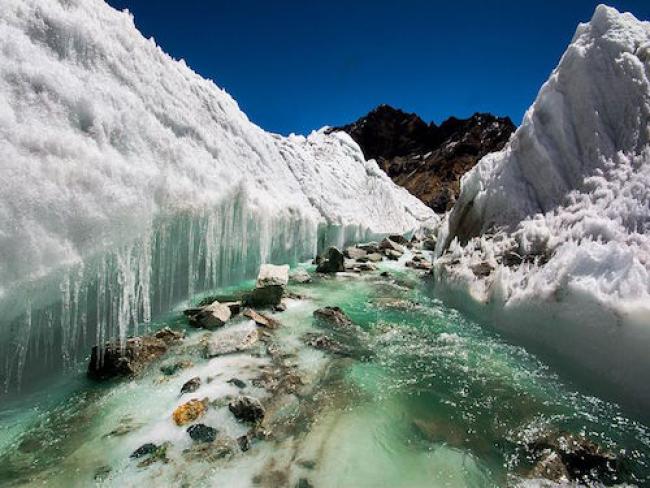Articles Menu

Sept. 24, 2019
The world’s leading international climate science agencies are predicting 2.9 to 3.4°C average global warming by 2100 based on governments’ current climate commitments, “a shift likely to bring catastrophic change across the globe,” The Guardian reports.
Just to keep average warming to 2.0°C, the report concluded that governments will have to triple their current climate targets (and, presumably, deliver on them). The United in Science report was one of a flurry of releases and statements this week that reinforced the depth of the crisis that UN Climate Action Summit delegates were supposed to be addressing.
“There is simply no time to waste,” wrote UN Climate Secretary Patricia Espinosa and UN Development Programme Administrator Achim Steiner in the report. “Climate change is fast outpacing us and needs an urgent response by all segments of society.”
“How many climate records does it take to accept the unprecedented nature of what we are living and to act upon it?” asked contributing author Pep Canadell, executive director of the Global Carbon Project.
The World Meteorological Organization, which coordinated the report, warned that the “signs and impacts of global warming are speeding up,” BBC reports, with 2014-2019 taking its place as the warmest five-year period on record.
“Sea level rise has accelerated significantly over the same period, as CO2 emissions have hit new highs,” BBC notes, and “the WMO says carbon-cutting efforts have to be intensified immediately.”
The report says average global temperatures have risen 1.1°C since 1850, and 0.2°C between 2011 and 2015, a five-year span when greenhouse gas emissions increased 20% over the previous period.
The WMO’s greatest concern is with sea level rise, which has averaged 3.2 millimetres per year since 1993 but hit 5.0 millimetres per year between 2014 and 2019. It also found that the oceans had the highest heat content on record in 2018.
“Basically we are on track to reach at least 1.2 to 1.3°C (above pre-industrial levels) over the next five years,” said WMO Senior Scientific Officer Omar Baddour. “It needs drastic actions.”
“Sea level rise has accelerated, and we are concerned that an abrupt decline in the Antarctic and Greenland ice sheets will exacerbate future rise,” said WMO Secretary General Petteri Taalas. “As we have seen this year with tragic effect in the Bahamas and Mozambique, sea level rise and intense tropical storms lead to humanitarian and economic catastrophes.”
The United in Science report came less than a week before today’s release of the latest analysis from the Intergovernmental Panel on Climate Change. The IPCC is expected to predict “three feet of rising seas by the end of the century, far fewer fish, weakening ocean currents, even less snow and ice, and nastier hurricanes” as the world’s seas warm, rise, lose oxygen, and get more acidic, CTV News reports.
“Climate change due to us is accelerating and on a very dangerous course,” said meteorology professor Brian Hoskins, chair of the Grantham Institute at Imperial College London, in response to the United in Science report. “We should listen to the loud cry coming from the schoolchildren. There is an emergency—one for action in both rapidly reducing our greenhouse gas emissions towards zero and adapting to the inevitable changes in climate.”
“Not only are these statistics alarming, they dispel any false sense of security that maybe we will muddle through this,” Maxx Dilley, director of the WMO’s climate prediction and adaptation division, told media. “There is going to have to be a dramatic scale-up in the level of ambition, and as well as in the level of actual follow-through on the current policies that are intending to address this.”
(See Climate Action Summit delegates’ response to that call, or lack thereof, here.)
But so far, the world’s poorest—who contributed the least to the climate crisis, and are often on the front lines of its worst impacts—are receiving less than 1¢ per day to adapt to the impacts, Oxfam Great Britain reported. “Millions of people are already living with the threat of deadly storms, rising floodwater, and failed crops,” said Executive Director Danny Sriskandarajah. Wealthy nations “should take urgent action to reduce emissions and provide financial support to the poorest communities to cope with the impact of climate change.”
“Poorer nations—many in places where climate change effects are hitting the hardest—have long demanded more financial support so they can build stronger homes, plant hardier seeds on farms, put in irrigation, and warn citizens of dangerous weather,” Reuters reports. “Yet cash for poor communities and countries to stay safe from weather shocks including storms and floods, and to cope with chronic stresses like drought, has been slow to come.”
After excluding repayable loans, the news agency adds, Oxfam calculated that the 48 least-developed countries received US$2.4 billion to $3.4 billion in climate adaptation finance in 2015 and 2016, or $2.50 to $3.50 per inhabitant per year.
In other summit-related releases, the Institute for Agriculture and Trade Policy called on governments to regulate Big Agriculture and make the shift to agroecology, while a meeting of the Climate and Clean Air Coalition agreed to “accelerate efforts to significantly reduce short-lived climate pollutants by the end of the next decade”. That action, intended to complement aggressive carbon dioxide reductions, would put the world on a “pathway that rapidly reduces warming in the near term and maximizes development, health, environmental, and food security benefits,” the coalition said.
The International Renewable Energy Agency (IRENA) issued a call to support small island states on the front lines of the climate crisis, adding that its newly-announced Climate Investment Platform would help those nations and other developing countries assemble the financing to respond to the crisis. And the Three Percent Club, a new coalition coordinated by the Washington, DC-based Alliance to Save Energy, said a 3% annual increase in global energy efficiency could deliver more than 40% of the greenhouse gas reductions required to meet the Paris Agreement targets.
[Top photo: Sharada Prasad CS/wikimedia commons]